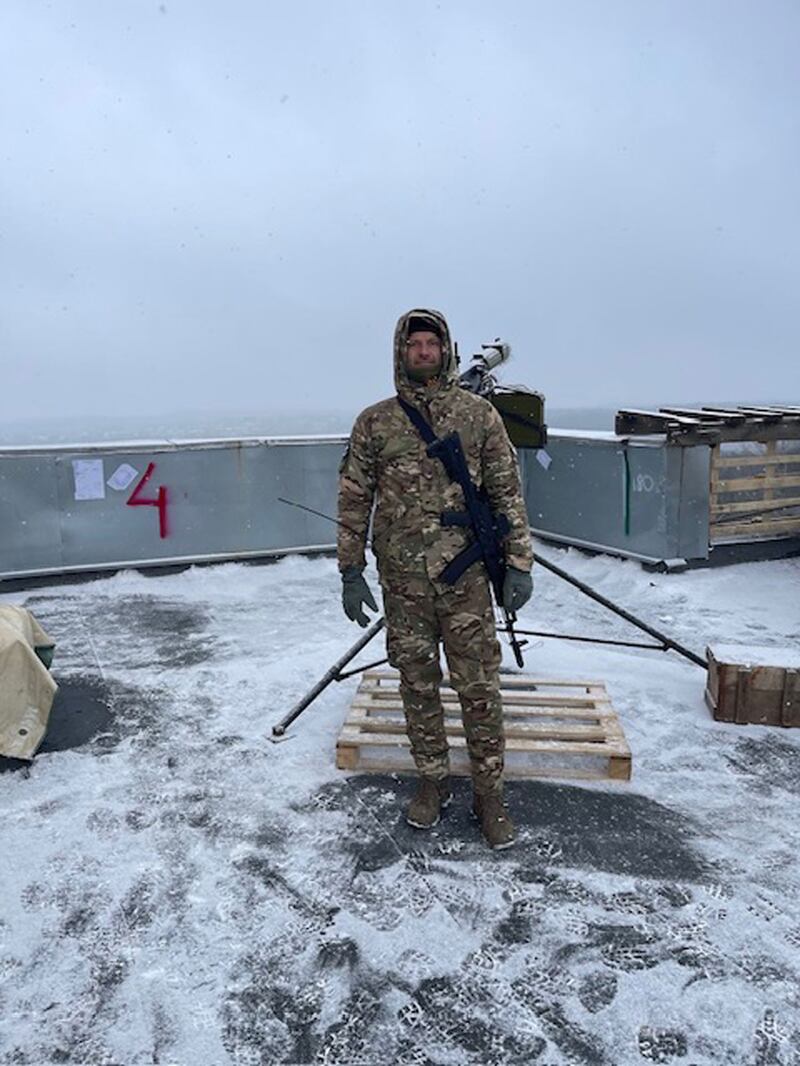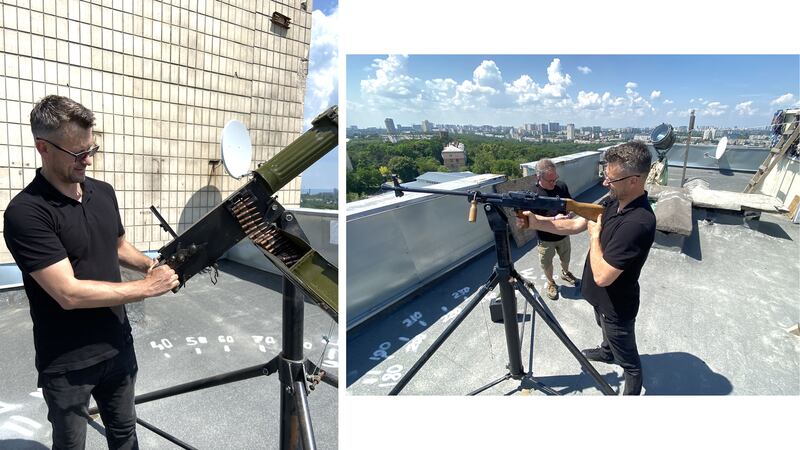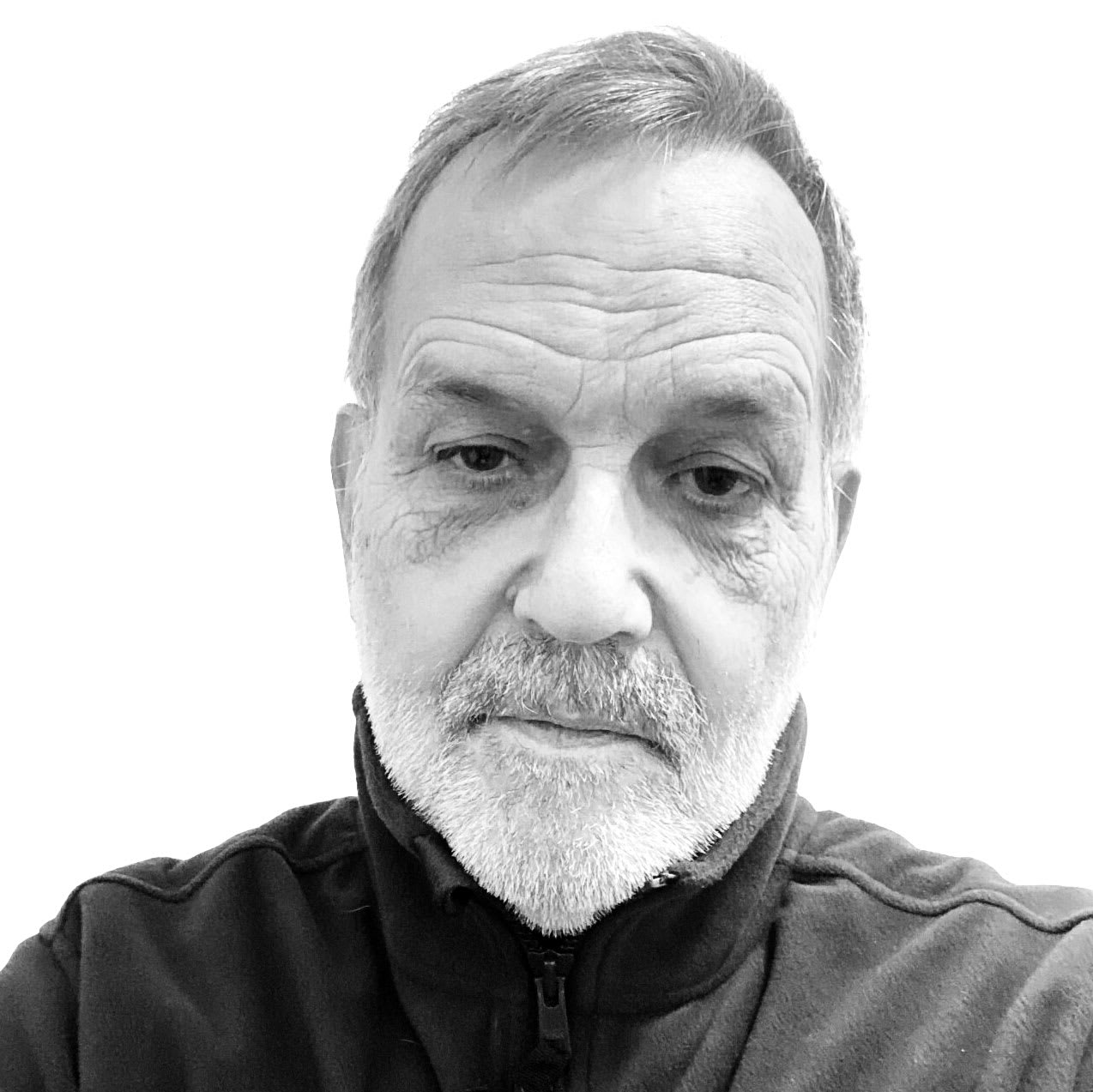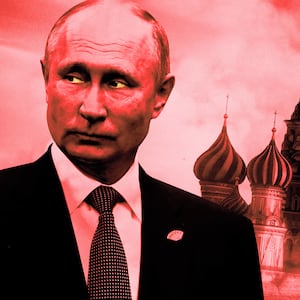KYIV—Sub-freezing weather is brutal on the rooftop of a ten-story apartment building. So are the Russian missiles and drones hurtling through the sky over Kyiv as regularly as the snow falls and the frigid wind blows.
Before the war began, it’s not somewhere you’d imagine a supreme court justice would spend much time, but Yuryi Chumak, 48, has spent more than a year on towering buildings commanding civilian volunteer defense squads stationed around Ukraine’s capital. They are tasked with fending off Vladimir Putin’s destructive flying machines.
Chumak is tall, thin and easy-going, but this is his second winter fighting the Russians; his third if you count when Chumak first picked up a handful of bullets and a rifle soon after Putin’s February 2022 invasion began.
Units like Chumak’s fill the gaps for the larger military anti-air installations and are made up of part-time reservists in the Territorial Defense Force. They are armed with vintage machine guns, and their rooftop gear includes the 1944 recoil-operated Soviet Maxim and smaller 1964 Czech ones. Incoming air attacks are tracked on tablets and cellphones.
Other than the guns, everything has been donated; night vision goggles, body armor and helmets, sleeping bags, boots, heaters, and medical kits are all supplied by private donors. It is a story repeated throughout Ukraine. This is a war where the defense forces are very much reliant on crowdfunding and non-profit organizations.
Chumak’s machine guns demand smart marksmanship and a bit of luck to hit the moving targets. The last success he recalls was this November when one of the three squads under his command shot down an Iranian-made Shahed drone on Holodomor Remembrance Day. It was the biggest attack since the 2022 full-scale invasion began. Russia sent 75 Iranian-made Shahed drones against Kyiv. Ukraine’s defenses took down 74.
“Five got passed us, but other squads were backing us up,” Chumak told The Daily Beast. “We have squads everywhere.”
I first met Chumak and his team last spring through Steven Moore of the aid organization, Ukraine Freedom Project, at a tired Soviet-style apartment building. Together, we rode up the 10 stories in a slightly bumpy elevator and then crawled through a small maintenance entrance to the roof. Everyone’s spirits magically jumped as a sweeping view unfolded of the ancient city now studded with gleaming high rises and carpeted with lush green parks.
Chumak showed off his machine guns, eagerly explaining the finer details. Then, he walked around to the side of a makeshift shelter fabricated with lumber and tarp on the rooftop where his team relax over a roughly assembled table, scroll through their phones and basically shoot the shit. One is an airline pilot, another works at a food manufacturer, a third does something… Well, it’s difficult to explain. “Entrepreneur,” that’s it, they laugh. “Entrepreneur.”
Crouching over a long, wooden green box, Chumak lifts the lid, showing me the secret weapon for special occasions—shoulder-mounted Stinger missiles. Expensive and limited in supply, fast-moving Stingers can blast almost anything out of the sky. Removing his stylish sunglasses, Chumak’s face lights up with a beaming smile. “These are what really work,” he said.
Keeping up with the incoming attacks was more daunting in 2022 than 2023, Chumak told me later over a phone call just before Christmas. “From November through March, we were very busy. It’s better now,” he said, adding that much of Putin’s incoming attacks targeting the country seem non-stop but the majority are now downed long before they reach the capital.

Chumak credits Ukraine’s allies in Europe and the U.S. who have supplied an effective panoply of anti-air defense systems now surrounding the city. The U.S. Patriot brings down Russian hypersonic missiles and the 50-year-old German Gephards with twin-barreled cannons handily stop slow-moving Iranian-made Shahed drones. A variety of short- to medium-range missile systems fills out the firepower, notably the Norwegian-U.S. supplied NASAMS (the same weapons used to protect Washington, D.C.) and the German IRIS-T.
Still, Chumak’s mood is more serious and reflective. His outgoing spirit from last spring has chilled. The husband and father of two daughters says, yes, it’s good news that Ukraine is on a path to joining the European Union, something that will bolster its economic ties with the West and encourage strong political reforms. “But it will take 10 or 20 years,” he says soberly. “NATO membership is more important.”
Not only would NATO membership beef up his country’s security from Russian aggression, but it would also bolster international investment confidence needed to rebuild from the destruction caused by Russia’s invasion—more than $400 billion will be needed. “If the United States and Europe could make a fast decision, it would be a very good solution because Russia could not attack Ukraine anymore. For sure that’s our dream.”
But NATO membership, like joining the EU, appears a distant reality.
And over $100 billion in supplemental funding for the war effort from the EU and the U. S. now hangs in limbo because a small number of skeptics on both sides of the Atlantic have successfully stalled the otherwise still robust political support for defending Ukraine.
Hungarian Prime Minister Viktor Orbán remains the obstinate outlier among the EU’s 27 members by opposing further funding. His solitary vote is blocking a proposed $50 billion in aid. In the U.S., a handful of Republicans in the House of Representatives who support former President Donald Trump, are claiming “Ukraine fatigue.” With just a razor-thin Republican majority in the House, this small number holds a threateningly tight leash on their frail congressional leadership and is using harsh and controversial domestic immigration proposals as a bartering chip for further Ukraine aid.
All the while, Ukraine is running low on bullets and artillery shells necessary to hold the Russians at bay. As part of a supreme court of 160 or so judges, Chumak is already dividing his waking hours between duties as a court justice, investigating Russian war crimes to be tried in The Hague and leading 100 reservists that were once part of a 700-member regiment called Mriya, Ukrainian for “hopeful dream.” That regiment of reservists, ranging in age from mid-twenties to late-sixties, has been reduced to about 400 people, he says.
Most of those who left have been fully mobilized into the military and are fighting on the frontlines of the conflict. Even Chumak seems to openly debate if he will be joining them. But that would require retiring from the bench, he explains. “It’s not an easy decision. Ukraine needs judges, too.”
He says he understands domestic politics among Ukraine’s international supporters are an issue and stresses his optimism. And he recounts the shortcomings of Ukraine’s spring offensive that is widely viewed as a stalemate despite many successes, especially in attacking the Russian navy and opening sea lanes for shipping Ukraine’s food products to the world. Again and again, he mindfully expresses gratitude to all of Ukraine’s supporters, but then returns to regrets—regrets that include the slow delivery of promised weapons from the west.

“This summer we tried to get back our lands, and to be frank, we failed because we took back only few territories, so that’s one point. Another point that is we didn’t have a lot of bullets, a lot of machine guns, a lot of tanks and other things, which were promised by United States and Europe and were slow to arrive.”
So, the present political situation in Europe and the United States only adds to Ukraine’s worries. “Russia is watching what is going on,” Chumak says. “They will attack again and again like they did at Bakhmut and if we don’t have guns and bullets, they will again be coming toward Kyiv, not with half their army like last time, but the entire army.”
While Chumak is confident Kyiv remains in safe hands, it is the rest of Ukraine he worries about. He says Ukrainians must be optimistic about support from its allies, but while funding for arms and support is used in political bargaining over domestic quarrels, Ukrainians are fighting for their lives and for their freedom.
Just as in the beginning of the war when Putin’s army descended on Kyiv before the West armed Ukraine, Chumak predicts “many people are going to die.”






